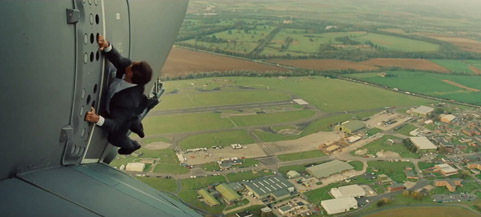Movie Review: Mission: Impossible - Rogue Nation
By Matthew Huntley
August 10, 2015
BoxOfficeProphets.com

But as impressive as Rogue Nation is with what it’s supposed to do, the question remains: does it do anything it’s not supposed to do? Or rather, does it ever defy our expectations or simply meet them? Although each of the M:I movies is unique in its own right, thanks to each one having a different director, they all share the same basic plot, along with the same setup and execution of it, which always involves members of the Impossible Mission Force (IMF) having to justify their actions or clear their names to a higher authority while independently trying to thwart a global terrorist. Rogue Nation is no different, and on that level, it feels a bit tiresome.
Of course, I realize the point of these movies is not to engage us with a fresh, original story or well-developed characters, but that’s not to say each installment’s story can’t at least be more different from the others. Even each of the James Bond and Fast and the Furious pictures, which also adhere to a tried-and-true formula, feels different enough that it still engages us beyond the action scenes. But Rogue Nation is unfortunately the first Mission movie that made me fear the series can’t sustain itself with this same narrative in place. Although the action scenes are still as awesome and mind-blowing as ever, those in between them are, dare I say, boring?
After the stupendous opening, things settle down as stalwart IMF agent Ethan Hunt (Cruise) embarks on a mission to prove the existence of an international terrorist network called the Syndicate. He’s actually tricked and captured by the network’s leader, Solomon Lane (Sean Harris), in a record store in London. Shortly thereafter, Janik “Bone Doctor” Vinter (Jens Hultén) is about to torture Hunt for information in a dark and damp cell underground, but the mysterious Ilsa Faust (Rebecca Ferguson), a disavowed MI6 agent, rescues him and arranges for his escape.
Hunt thinks he can enlist his faithful IMF team to help track down the Syndicate, but the organization has been absorbed and disbanded by the CIA at the request of director Alan Hunley (Alec Baldwin), who pleads before an oversight committee that the IMF is too costly, reckless and lacks transparency (he presents evidence of their damage from the previous movies). The organization’s disbandment now makes a Hunt a fugitive rather than a legitimate agent and he must covertly contact his unit, which includes William Brandt (Jeremy Renner), Benji Dunn (Simon Pegg) and Luther Stickel (Ving Rhames). He also reconnects with Ferguson, whose “good guy”/“bad guy” status remains questionable as we wonder what her motivation is and what angle she’s playing. There is, of course, a light romantic tension between Hunt and Ferguson, but the screenplay never takes it beyond light.
As is typical of any M:I plot, Hunt and company must travel to all corners of the world to carry out their mission. In addition to Minsk and London, the movie also takes us to Vienna and various cities in Morocco, so it works doubly as a travelogue. And it just wouldn’t be Mission: Impossible if Hunt didn’t narrate what it’ll take for he and his team to steal some highly protected material (he speaks as the movie shows us the security involved), in this case an encrypted file housed in an underwater database. Should person trying to access the file not have proper clearance, then…well, let’s just say you want to have proper clearance.
This latter detail sets up one of the movies best and most original sequences, which I’ll spare summarizing since it’s so much fun to watch as it plays out. And even though we can anticipate its outcome, writer-director Christopher McQuarrie and editor Eddie Hamilton keep the tension tight and alive, and this continues all the way through an ensuing motorcycle chase, which may be one the best of its sort (and yes, that really is Cruise on the bike).
Eventually, the plot boils down to a battle of wills and a traditional foot chase and knife fight around the streets of London. This will satiate most viewers and I was ultimately satisfied, too, because the thrills in Rogue Nation overshadow its hackneyed storyline. Nevertheless, the movie left me feeling cautious and uncertain about future M:I installments. I want them to stay lively because I feel they are made with the utmost integrity and because Cruise and the filmmakers aren’t willing to compromise when it comes to the action and stunts. But they do seem willing to water down and re-use the plots on which the action and stunts hang. I’m not sure how long this approach can go on. At this point in the long-running series, it’s time they channel some of that uncompromising attitude toward the screenplay.